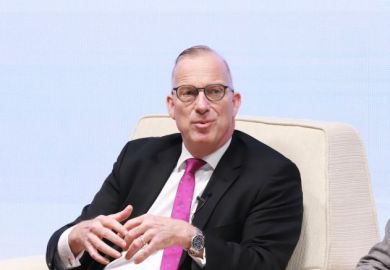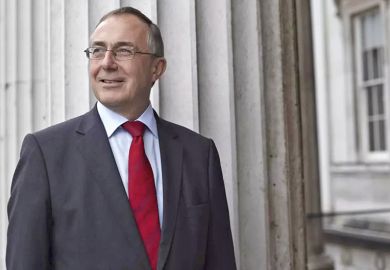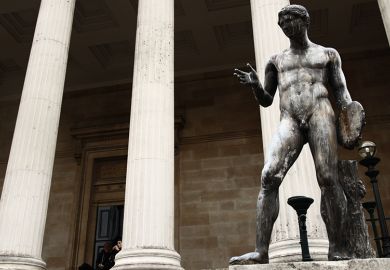Michael Spence is no stranger to large universities, having led, at the University of Sydney, an institution with more than 60,000 students on its books.
But the new president of UCL said that “hard choices” would have to be made about the scope of the university’s activities if it was not to become a 50,000-student campus over the next few years.
UCL’s recent expansion – it had just 17,000 students as recently as 2005 but is now the biggest in the UK apart from the Open University – has been criticised by some scholars over its potential impact on academic quality and financial stability.
Dr Spence said that academics should acknowledge how the institution’s expansion to almost 44,000 students had been crucial for funding its activities. Recruiting international students had become particularly important for research-intensive universities in the UK and Australia given the “increased cost of facilities and equipment for research and, for teaching, the increased expectations for student experience, both inside and outside the classroom”, he said.
But Dr Spence said that he was also keen to hear staff views on which activities they deemed no longer essential for UCL as part of “deep consultation with the academic community” on the institution’s five-year strategic review, which will begin this summer. His predecessor at UCL, Michael Arthur, faced long-running staff discontent over an allegedly top-down management style.
“If you are not going to grow in an unbridled way, you have to have a clear strategy about what you are – and what you are not – going to do,” said Dr Spence, who joined UCL in January. “Some of the questions we will be asking are: ‘If these are our aspirations and this is the size and shape of university to fund those aspirations, do we need to think about changing our aspirations? Are there things that we currently do that we ought not to do?’”
Dr Spence, a former head of the University of Oxford’s Social Sciences Division, acknowledged that “there are ways in which we can get smarter and leaner in our administrative spend”.
But the intellectual property expert, who oversaw significant structural changes at Sydney – reducing the number of faculties from 16 to six and condensing 122 undergraduate degrees into 25 core programmes – indicated that finding cuts to professional support services may not be sufficient to balance the books.
“We will need to make some hard choices in this strategy – if the institution is to remain sustainable and not simply to grow – about what we want to do over the next five years,” Dr Spence said.
There was a risk, he continued, that UCL was seen as a “marvellous, slightly chaotic comprehensive metropolitan research university that just kept on growing and growing as its costs grew”, adding that “at some point, you have to make a few decisions about what not to do [in order] to make things sustainable”.
The other issue that has the potential to put significant pressure on UCL’s budget is international recruitment – almost £300 million of its £1.5 billion annual income comes from non-European Union student fees – amid continuing uncertainty about post-pandemic enrolments.
But Dr Spence was upbeat on this front, having already seen disastrous forecasts about an exodus of international students from Sydney proved to be overly gloomy.
“We didn’t need to make cuts in the end – our international students remained loyal and I think the same will be true for UCL, so I don’t predict any great reductions [in student numbers],” he said.
“UCL will be able to weather the Covid storm, but there is a wider long-term question about how a comprehensive research university achieves financial sustainability.”
Dr Spence returns to UK higher education when it is facing growing criticism on a range of issues including, most recently, what some regard as a free speech crisis that has seen academics and guest speakers harassed and no platformed for their opinions.
Having seen similar scenes unfold in Australia, Dr Spence was sceptical about the extent of this problem. “Australia invited a judge to investigate and found there wasn’t a problem of free speech at its universities,” he reflected.
That said, he has concerns about the rancorous nature of public debates in recent times.
“Do I think universities are always places where people disagree well? No, I don’t,” he said. “We need to be better at admitting we’re wrong, we need to be better at identifying the real points of difference and not just create an enemy of the other.”
UCL’s history of promoting “disruptive thinking” – it was the first entirely secular UK university to admit students regardless of religion, and the first to admit women on the same grounds as men – meant it had a particular duty in this regard, he added.
“Since 1826, we have seen ourselves as being provocative and passionate about ideas and that’s great…as long as you are also good at listening and that is what we need to practise as an institution,” he said. “We want people to feel they can go to the stake to defend their ideas but they also have to be really good at listening.”
POSTSCRIPT:
Print headline: ‘Hard choices’ for Spence over UCL’s sustainability
Register to continue
Why register?
- Registration is free and only takes a moment
- Once registered, you can read 3 articles a month
- Sign up for our newsletter
Subscribe
Or subscribe for unlimited access to:
- Unlimited access to news, views, insights & reviews
- Digital editions
- Digital access to THE’s university and college rankings analysis
Already registered or a current subscriber?








